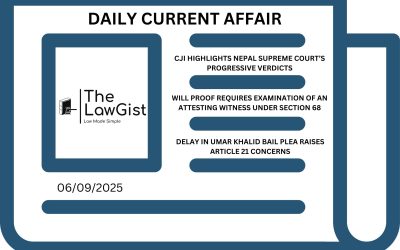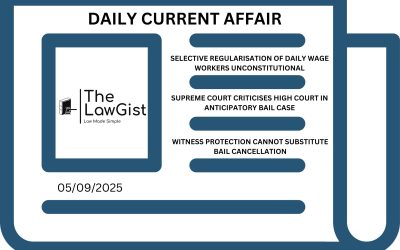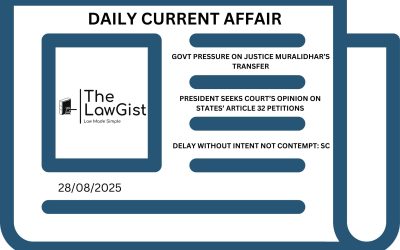
Supreme Court issues key rulings: 3% OBC quota in Chandigarh, BCI’s tenure rule challenged, and criminal cases quashed in civil disputes lacking criminal intent.
DAILY CURRENT AFFAIRS (01 AUGUST 2025)
SUPREME COURT DIRECTS 3% OBC RESERVATION IN CHANDIGARH EDUCATIONAL INSTITUTIONS
Case Name: DHRUVI YADAV PETITIONER(S) vs. UNION OF INDIA & ORS. RESPONDENT(S)
The Supreme Court has ordered the Chandigarh Administration to provide 3% reservation to OBCs in educational institutions for the 2025–26 academic session. The Court emphasized that affirmative action must reflect statutory intent and directed compliance with the 27% reservation norm notified under the Central Educational Institutions (Reservation in Admission) Act, 2006.
Legal Provision
The legal provisions are mentioned below –
- Article 15(4) & 15(5) – Special provisions for socially and educationally backward classes
- Central Educational Institutions (Reservation in Admission) Act, 2006
- Mandal Commission-based OBC reservation policy
Source: Supreme Court of India
SC SEEKS BCI’S REPLY ON EXTENSION OF STATE BAR COUNCIL TENURE
Case Name: M. VARADHAN Petitioner(s) vs. UNION OF INDIA & ANR.
The Supreme Court issued notice to the Bar Council of India on a PIL challenging Rule 5 of the BCI Rules, which allows tenure extensions of State Bar Councils beyond five years. The petitioner contends it violates the Advocates Act’s democratic mandate and delays fair elections.
Legal Provision
The legal provisions are mentioned below –
- Section 8 of the Advocates Act, 1961 – Term of office of elected members of State Bar Councils
- Rule 5, Bar Council of India Rules – Provision for extension of tenure
- Article 19(1)(c) – Right to form associations
Source: Supreme Court of India
CRIMINAL CASE CAN BE QUASHED IF CIVIL DISPUTE PENDING ON SAME ISSUE
Case Name: S. N. VIJAYALAKSHMI & ORS. vs. STATE OF KARNATAKA & ANR.
The Supreme Court held that when a civil case is already pending on the same issue and there’s no element of criminal intent, the corresponding criminal case can be quashed. It reiterated that criminal proceedings should not be used as a coercive tool in civil disputes.
Legal Provision
The legal provisions are mentioned below –
- Section 420 IPC
- Section 406 IPC
- Article 142 – Supreme Court’s power to do complete justice
- Paramjeet Batra vs. State of Uttarakhand, (2013) 11 SCC 673
Source: Supreme Court of India
Also Read: DAILY CURRENT AFFAIRS (31 JULY 2025)







